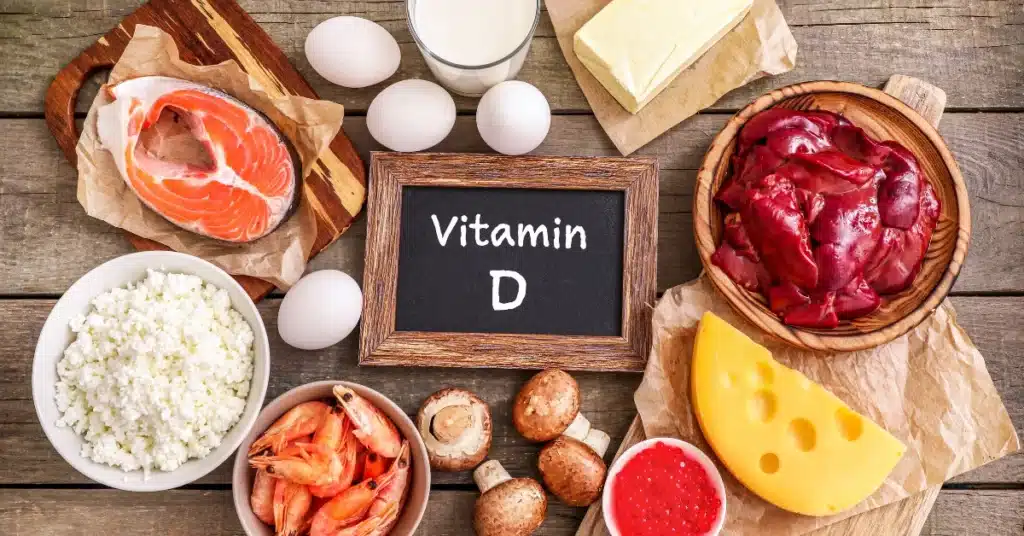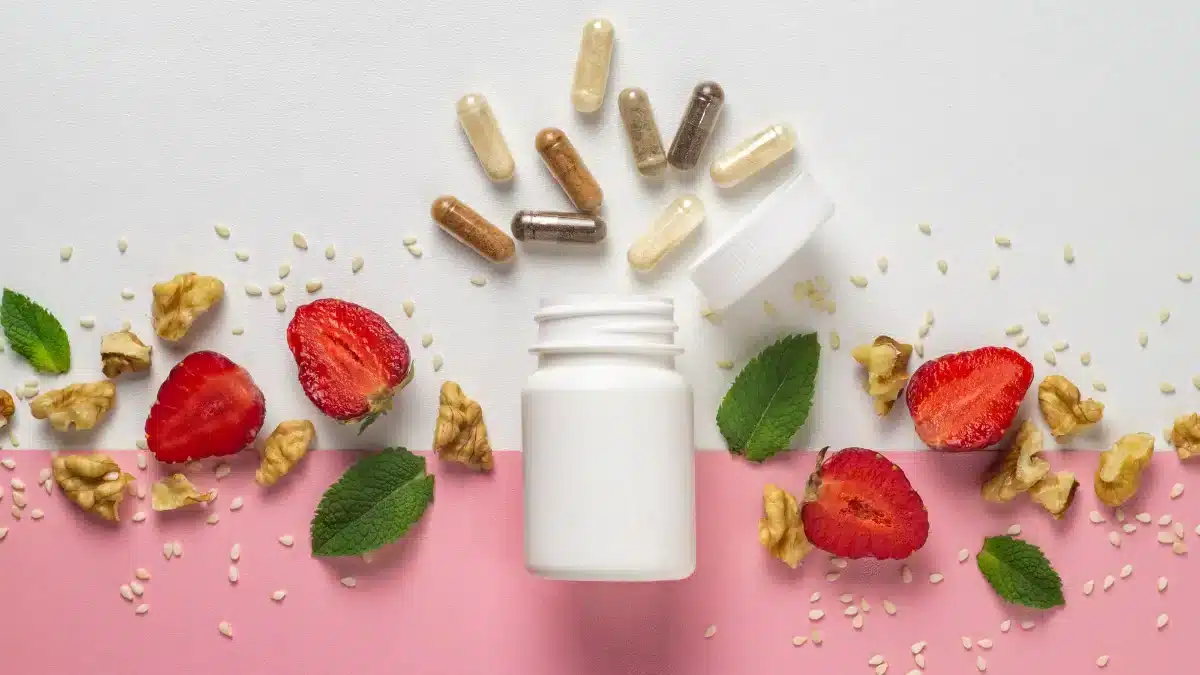Vitamins to Lower Testosterone in Females: Harnessing the Potential of Vitamins
Testosterone, often associated with males, is also present in females in small quantities, originating from the ovaries and adrenal glands.
Excessive Testosterone in women can lead to undesirable symptoms such as increased facial hair, acne, irregular menstrual cycles, and fertility issues.
Fortunately, there are natural ways for women to manage excessive Testosterone levels without resorting to synthetic hormones or medications.
Some vitamins have been scientifically shown to aid in restoring normal Testosterone levels in females.
In this article, we will explore the vitamins to lower Testosterone in females.
Vitamins to lower Testosterone in females
Let’s explore the important vitamins and their contributions to supporting women’s well-being and hormonal balance.
Vitamin D

Ensuring an adequate intake of Vitamin D, whether through sunlight exposure, diet, or supplements, can be a valuable strategy to regulate Testosterone levels in women.
Vitamin D is instrumental in controlling over 200 genes, many associated with hormonal functions.
Studies have shown that there is a link between having a deficiency of Vitamin D and elevated Testosterone levels, particularly in women with Polycystic Ovary Syndrome (PCOS).
Supplementing with Vitamin D can reduce Testosterone levels by enhancing insulin sensitivity and reducing inflammation.
Adults should consume at least 600 IU (15mcg) of Vitamin D daily.
Sources of this essential Vitamin include oily fish, egg yolks, and fortified foods.
Vitamin B6
Vitamin B6 plays a crucial role in hormonal regulation, including Testosterone.
It is actively involved in the synthesis of neurotransmitters that influence Testosterone secretion.
Studies suggest a daily intake of 50-100 mg of Vitamin B6.
Food sources rich in this vitamin include poultry, fish, starchy vegetables, soymilk, and fortified cereals.
Supplements to lower Testosterone in females
Supplements play a pivotal role in helping women regulate their Testosterone levels.
In situations where hormonal imbalances occur, these supplements, such as Zinc, spearmint tea, Chasteberry, and Saw Palmetto, offer a promising solution.
Let’s understand them in detail:
Zinc

Zinc, a key player in hormone balance and reproductive health for both genders, is crucial for proper Testosterone synthesis and metabolism.
Research points to Zinc deficiency potentially contributing to high Testosterone levels in women with PCOS.
Including Zinc-rich foods like oysters, meat, nuts, and legumes in your diet, or opting for a Zinc supplement may work wonders in restoring optimal Zinc levels.
Spearmint tea
Spearmint tea packs anti-androgenic compounds that, when consumed regularly, may help reduce Testosterone levels in females.
The same study observed a significant drop in Testosterone levels in women with Hirsutism and Androgenic Alopecia after drinking spearmint tea twice daily for one month.
This advantage lies in the flavonoids of spearmint tea, which can inhibit Testosterone activity and conversion.
Chasteberry
Chasteberry, a traditional herb known for balancing female reproductive hormones, contains flavonoids that influence hormone secretion, including Testosterone.
Research suggests that Chasteberry extracts can be effective in mitigating high Testosterone levels in women with PCOS.
The standard dosage typically ranges from 200-400 mg per day of a standardized extract.
Saw Palmetto
Saw Palmetto, often associated with treating Benign Prostatic Hyperplasia in men, may also be a tough opponent against Testosterone production and activity in women.
The recommended dosage typically stands at 320 mg per day.
Discover actionable insights to take charge of your hormonal balance.
Conclusion
Testosterone often poses specific challenges for women.
Hence, the therapeutic potential of vitamins and supplements emerges as a beacon of hope.
Vitamin D mitigates the undesirable consequences of elevated Testosterone levels.
Additionally, Vitamin B6 not only normalizes Testosterone but also significantly diminishes the risk of Colorectal Cancer by an impressive 20%.
Supplements, such as Zinc, spearmint tea, Chasteberry, and Saw Palmetto, offer promising solutions to counteract hormonal imbalances.
Individuals seeking these remedies must consult healthcare professionals before adopting dietary modifications or embracing new supplement regimens.
This collaborative approach ensures the most secure and productive route to nurturing overall well-being and hormonal equilibrium.
Frequently Asked Questions
Which vitamins lower Testosterone in females?
Vitamin D, obtained from sunlight, diet, or supplements, helps regulate hormones and has been linked to lower Testosterone. Vitamin B6, found in foods like poultry and fish, contributes to hormonal balance and can help normalize Testosterone levels in women.
How can I lower my Testosterone as a woman?
To lower Testosterone as a woman, consider natural approaches. Vitamins like Vitamin D and Vitamin B6 can help. Adequate intake of Vitamin D and Vitamin B6 aids hormonal balance. Additionally, supplements like Zinc, spearmint tea, Chasteberry, and Saw Palmetto can be beneficial in managing Testosterone levels.
Is there a Vitamin for low Testosterone?
Yes, certain vitamins can help manage low Testosterone. Vitamin D is a key player, as it’s associated with hormonal regulation. Additionally, Vitamin B6 plays a role in hormone balance. Both can aid in restoring and maintaining healthy Testosterone levels in the body.
How can a woman block Testosterone naturally?
Women can naturally regulate Testosterone by embracing vitamins and supplements. Vitamin D helps control hormone activity, while Vitamin B6 is crucial for hormonal balance. Supplements like Zinc, spearmint tea, Chasteberry, and Saw Palmetto offer effective ways to manage Testosterone levels.
WowRx uses only high-quality sources while writing our articles. Please read our content information policy to know more about how we keep our content reliable and trustworthy.






